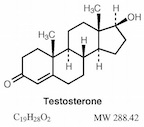Steroid hormones: Difference between revisions
Jump to navigation
Jump to search
No edit summary |
Cleaned up the references. |
||
| (3 intermediate revisions by 3 users not shown) | |||
| Line 1: | Line 1: | ||
[[Image:Testosterone Molecule.jpg|right|Testosterone Molecule]] Steroid hormones are [[Cholesterol|cholesterol]] based [[Endocrine|endocrine]] signalling molecules consisting of [[Adrenocorticoids|adrenocorticoids]], [[Glucocorticoids|glucocorticoids]] and [[Gonadocorticoids|gonadocorticoids]] released by the [[Adrenal gland|Adrenal gland]]<ref>Androgel Unimed, 2014. available fromhttp://www.theodora.com/drugs/androgel_unimed.html[accessed 21/10/14]</ref>. | |||
The most common hormones released are [[Aldosterone|Aldosterone]] (regulation of electrolytes in the ECF), [[Cortisol|Cortisol]] (regulation of cellular metabolism and stress) and [[Testosterone |Testosterone]] (predominently [[ | The most common hormones released are [[Aldosterone|Aldosterone]] (regulation of electrolytes in the ECF), [[Cortisol|Cortisol]] (regulation of cellular metabolism and stress) and [[Testosterone|Testosterone]] (predominently [[Male sex hormones|male sex hormones]] and some [[Female sex hormones|female sex hormones]]). Steroids are lipid soluble and diffuse into cells by binding with a complementary nuclear receptor that transports the hormone into the [[Nucleus|nucleus]] where it binds with a specific [[DNA-receptor protein|DNA-receptor protein]] turning on its target [[Gene|gene]] and initiating the [[Transcription|transcription]] process for the manufacture of a protein such as an [[Enzyme|enzyme]]<ref>Marieb EN, 2001. Chapter 17, Human Anatomy and Physiology 5th Edition, p609-635.</ref>. | ||
=== References === | |||
=== | |||
<references /> | <references /> | ||
Latest revision as of 13:52, 5 December 2017

Steroid hormones are cholesterol based endocrine signalling molecules consisting of adrenocorticoids, glucocorticoids and gonadocorticoids released by the Adrenal gland[1].
The most common hormones released are Aldosterone (regulation of electrolytes in the ECF), Cortisol (regulation of cellular metabolism and stress) and Testosterone (predominently male sex hormones and some female sex hormones). Steroids are lipid soluble and diffuse into cells by binding with a complementary nuclear receptor that transports the hormone into the nucleus where it binds with a specific DNA-receptor protein turning on its target gene and initiating the transcription process for the manufacture of a protein such as an enzyme[2].